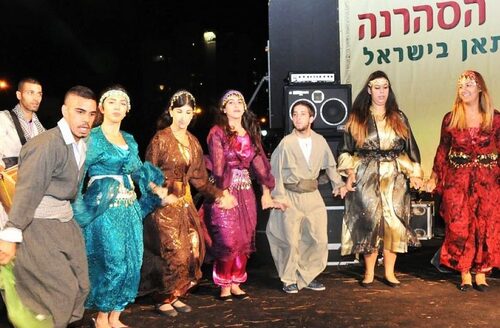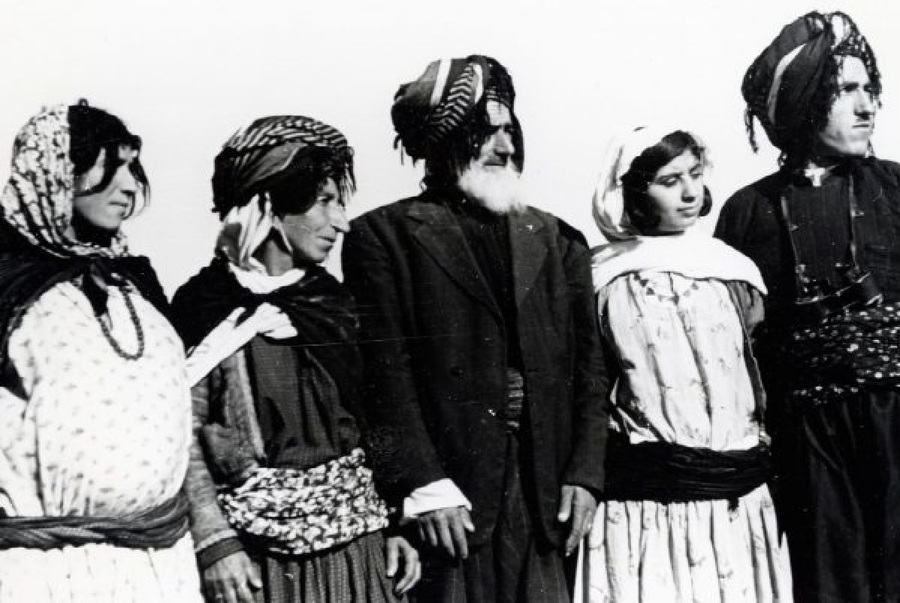Peiman
A part of the history of Kurdistan that explains the social situation and national and religious structure of our land will remain unclear if the Jews who lived in Kurdistan are not mentioned. It is important to know how many Jews lived in Kurdistan before they went to Israel, how and where they came from, how they spread in the cities and villages, in which part of Kurdistan they lived, what was their occupation, how the Muslims, the ordinary people, and the authorities treated them. How did they see themselves and their Kurds' The Others?
Here, a summary of the Jews of Kurdistan especially those who lived in Boukan will be discussed before Israel was formed:
The exact time when the Jews moved to the Kurdish lands is probably not clear but undoubtedly, they moved to different parts of Kurdistan creating their own communities. In some places, they formed their own independent geographical regions and within the cities, the Jewish neighborhoods were known to all.
The Jews living in Kurdistan were known as "Mirzahi" Jews which means eastern who had lived in the Middle East since a long time ago. The "Safardi" Jews might have been mixed with them more or less. Safardi Jews refer to those Jews who were originally from Spain and Portugal. At the end of the 15th century, after Andalucía collapsed and was occupied by the Christian Emperor of Spain, the Safardi Jews were deported from Spain Islands and Portugal, thus they moved to the Islamic countries.

It is important to know that there were a small number of Jews living in the Middle East and northern Africa that is the Islamic countries, however, perhaps their communities' numbers, their people, or their occupations were different from one another and this shows a great deal of their political and social lives and their relationship with those countries' citizens. As was mentioned, the Jews from Kurdistan claim they have lived in this area for more than 2500 to 2800 years ago when the Assyrian king dominated Israel at that time and displaced the Jews. But, as we talked about the Safardi Jews, they came from Spain and later they mixed with the Kurdistan Jews. Jews from other parts of the world have come to Kurdistan for they were known to be living in good and prosperous conditions and mixed with them in various times and situations.
A Jewish traveler called Benyamin Tudella or in Arabic "Benyamin Altuteylli" who was from Tudella city in the north of Spain began his journey a short time after his city was occupied by the Christians, and Muslims’ rule collapsed, had mentioned in his book that he had visited the Jews in Kurdistan cities and villages. At the same time, Benyamin had traveled with Salahaddin Ayubi and the Ayyubid authorities to the northern parts of Africa, Sham, Mesopotamia, and the lands under the control of the Salukis. He wrote his travelogue before Marco Polo and he talked mostly about the Jews' lives. He had talked about the Jews from Mosul, Erbil, Amedi, and Jazir and the other places he had visited were a part of the old or the new Kurdistan land. What is very interesting is that the translator who translated this book from Arabic to English in 1907 had mentioned Kurdistan's name several times in the footnotes while Benyamin did not mention the name of Kurdistan directly.
There were times when the Jews had such numbers of people and strong positions that considered themselves strong enough to act independently and they had even participated in battles and had revolted against their rulers. Among these stories, Benyamin talks about the Jews from Amedi who had begun to revolt under "Davoud Alroy"; they even tried to redeem the Jews who lived within the geography of nowadays Iran under the control of that time Kings. As it is being said they included hundreds of Jewish clans inhabiting lands from Amedi to Gilan and Tabarestan. He talks about the Jews living in the Iranian kingdom were under a lot of pressure. "Davoud Alroy" had wished to go back and reclaim the Israel land and make the holy land a Jewish country. Again, in this part, the translator of Benyamin's book mentions "Amedi" or "Amedia" or "Alamadia" to be a Kurdish city above Mosul. This revolution happened from 1160 to 1170.

The Jews' Language in Kurdistan
A very significant subject is the language the Jews living in Kurdistan used to speak with. They had talked in a language that was a combination of Jewish-Arami. Arami which is a language very close to Ibri and is one of the sublanguages of Sami was an important language for diplomatic and scientific communication among the nations of the Middle East. The history of this language application goes back to several centuries BC. Gradually, Arami replaced the Ibri language in all fields of trading and exchanging goods to a level that was spoken even at home and Ibri was only used for special occasions and religious ceremonies. We should mention that Arami was also the language of a part of the Christian communities in the Middle East. When the dialect of the Jewish_Arami is being discussed, it is for mentioning the language used by the Mirzahi Jews, those who were from the east, to discuss the Kurdistan Jews' language.
The Jews from Kurdistan have spoken various dialects of this language. The Mirzahi Jews of Kurdistan had four main dialects in a way that the Jews' accent from Boukan had a distinct accent from those who lived in Mahabad. These four accents were "Lishana Dani" used by Jews who lived in Botan, Jazira, Duhok, Akre, and Barzan. "Lishan Didan", that was spoken within Gavar and Urmia to Mahabad. "Lishanid Noshan" that was used in Erbil, Ruwandz, Qaladze, and Koya. "Holawla" accent used by the Jews from Boukan, Saqqez, Sna, Kameran, Halabja, Suleimani, and Qasr Shirin. The Jews from Kurdistan also were able to talk in different Kurdish accents based on the geographical area they had inhabited with a majority speaking in the Badinan Kurmanji dialect. The Jews living in Kurdistan had only used Kurdish dialects to communicate with the local people and among themselves, Kurdish was one of the languages that was used by them. As it is known, the Jews who moved to Israel from Kurdistan still like the Kurdish music and they sing Kurdish songs. The Jews lived in three parts of the North, South, and East of Kurdistan, however, they were mainly living in the South and East parts of Kurdistan.








